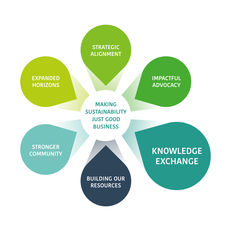EAUC commissioned the research paper ‘Next Generation Sustainability Strategy and Structure’ to help members understand the current sustainability landscape in tertiary education.
This case study is from Université Laval
Structure: Decentralised
Highest level of authority: Executive Level
Web: https://www.ulaval.ca/en/sustainable-development.html
Sustainability at Université Laval has a decentralised structure. It is led by a team of two: one executive and one professional, who are positioned within the Office of the Executive Vice-Rector, Development (VREX). The VREX oversees the daily operation of the university, and because of this overarching role, the office is well positioned to coordinate sustainability holistically. Below this, responsibility for sustainable development is decentralised and sits with sustainability ‘stakeholders’ - professionals across eight different areas such as education, procurement and facilities, encompassing all university activities between them.
Supporting the decentralised structure is a Sustainable Development Issue table of 25 members, which considers sustainable development objectives and strategies. There is also a network of sustainability champions across all faculties and services, taking responsibility within their own areas with the aim to further embed sustainability.
There is a dedicated sustainability fund, and resources towards sustainability are defined such that funding can come from this budget, including proportions of the salaries of some of the sustainable development stakeholders. Sustainability is one of the President’s three main themes, alongside internationality and research, having played a large part in his election campaign. It is incorporated within the corporate strategy, and is explicitly stated as one of the university’s core values.
Read the full report here and additional case studies here.






 Except where otherwise stated, content on this site is
licensed under a Creative Commons Attribution 3.0 License.
Except where otherwise stated, content on this site is
licensed under a Creative Commons Attribution 3.0 License.
